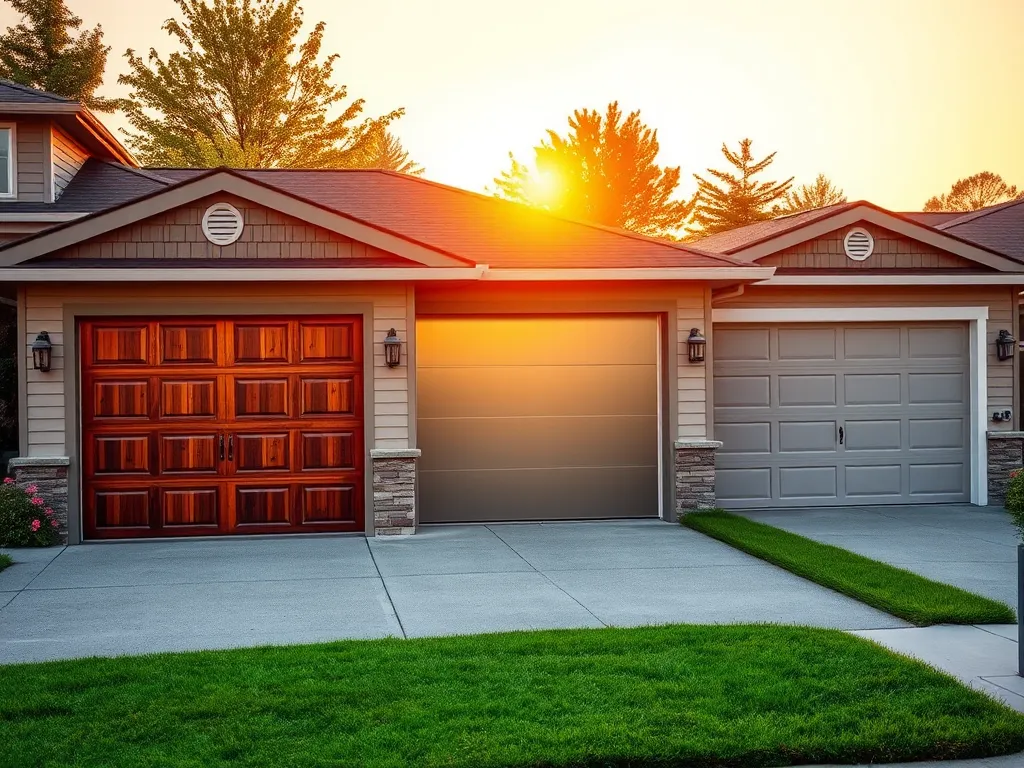Choosing Garage Door Material: Wood, Steel, or Aluminum?

Understanding Garage Door Materials: A Comprehensive Guide
When it comes to home improvement and enhancement, the choice of garage door materials plays a crucial role. Garage Door Materials not only define the aesthetics of your home but also impact functionality, cost, and maintenance. With diverse options available, homeowners are often faced with the challenge of choosing the right material that meets their needs and preferences.
In this guide, we will explore the various types of garage door materials available in the market today. Each material has its own unique characteristics, advantages, and disadvantages. From the traditional wood to modern steel and aluminum options, understanding these materials will help you make an informed decision when selecting your garage door.
Exploring garage door insulation properties can help in energy saving.
Garage Door Materials can influence not just the exterior appearance of a property but also its insulation capabilities, durability, and security features. Factors such as climate, budget, and personal style preferences must be considered when selecting the right material for your garage door. We will delve into the specifics of wood, steel, and aluminum garage doors, providing insights into their features and functionalities.
By examining the comparisons of different garage door materials—wood, steel, and aluminum—we aim to give you a clear picture of what to expect from each option. It’s important to weigh the pros and cons of each material and understand how they align with your needs. Maintenance requirements, installation processes, and value retention are also crucial factors in your decision-making process.
Let’s dive deeper into the various materials available for garage doors, starting with one of the most classic options: wood.
Exploring Wood Garage Doors
Wood garage doors are renowned for their natural beauty and elegance. One of the main advantages of wooden garage doors is their ability to enhance the overall curb appeal of a home, providing a warm and inviting appearance. Furthermore, wood can be custom designed to match different architectural styles, making it a versatile choice for many homeowners.
To make an informed decision, consider a garage door durability comparison.
However, wooden garage doors require regular maintenance to keep them looking their best. They need to be stained or painted every few years to protect them from weather damage and pests. Additionally, wooden doors may warp or crack over time, depending on climate conditions, so ongoing inspection is essential.
The best wood types for garage doors include cedar, redwood, and mahogany due to their natural resistance to moisture and insects. Cedar is particularly popular for its lightweight properties and beautiful finish, while mahogany offers a richer, darker color and superb durability.
Understanding your garage door maintenance needs is crucial for longevity.
Insulation properties can vary with wooden doors. While solid wood provides good insulation, many wooden garage doors can also be constructed with insulated cores to further enhance energy efficiency, making them a good choice for climates where temperature control is important.
Understanding Steel Garage Doors
Steel garage doors are among the most popular choices for homeowners due to their strength and durability. The primary benefits of choosing steel include high resistance to damage, low maintenance, and a variety of design options. Steel doors can be painted and insulated, making them versatile in both functionality and aesthetics.
In terms of durability and security, steel doors are hard to beat. They are resistant to warping, cracking, and rusting, making them ideal for regions with harsh weather conditions. Additionally, they provide superior security features compared to other materials, ensuring that your garage and home remain secure against intruders.
When it comes to design options, steel garage doors can mimic the appearance of wood through embossing and painting techniques. This allows homeowners to enjoy the aesthetic appeal of wood without the extensive upkeep. Various styles, colors, and finishes are available to complement any home design.
Cost-wise, steel garage doors often provide better value for money compared to wood. While the initial investment may vary based on the quality of steel and insulation, steel doors typically last longer, making them a cost-effective choice in the long run as they require fewer repairs and less maintenance.
An Overview of Aluminum Garage Doors
Aluminum garage doors are celebrated for their lightweight features, making them easy to operate and install. One of the significant benefits of aluminum is its resistance to corrosion, which is especially advantageous in coastal areas where salt spray is prevalent.
In addition to corrosion resistance, aluminum garage doors provide excellent durability. Unlike wood, they do not warp, crack, or swell, which allows them to maintain their appearance regardless of the weather conditions. This resilience makes them a low-maintenance option for homeowners.
Customization options are also a highlight for aluminum garage doors. Homeowners can choose from various styles, colors, and finishes, ensuring that their garage door reflects their personal style. Furthermore, aluminum can be easily shaped and designed to fit unique architectural elements.
Energy efficiency is another significant advantage of aluminum garage doors. They can be insulated to improve thermal performance, helping to keep the garage comfortable regardless of external temperatures. This creates a more energy-efficient home overall, saving on heating and cooling costs.
Comparative Analysis of Garage Door Materials
When comparing costs between wood, steel, and aluminum garage doors, it is essential to consider both the initial purchase price and long-term maintenance costs. While wooden doors may have a lower initial cost, the frequent maintenance required can add up, whereas steel and aluminum doors may involve higher upfront investments but will save money over time due to lower maintenance needs.
Longevity and lifespan differ significantly between materials. Steel doors generally last the longest (20-30 years), followed by aluminum (15-25 years), while wooden doors may require replacement or significant repairs every 10-15 years, depending on maintenance and environmental exposure.
Aesthetic appeal and design flexibility vary across materials; wood offers warm aesthetics but requires regular upkeep, steel provides a versatile appearance with low maintenance, and aluminum boasts modern design options with minimal care. Homeowners need to assess which material aligns with their design vision.
Environmental impact is a growing concern when selecting garage door materials. Wood is a renewable resource, but unsustainable sourcing can be an issue. Steel recycling reduces waste, while aluminum is highly recyclable and can be less energy-intensive to produce compared to steel, making it a more sustainable option.
Installation and Maintenance Considerations
Installation costs for garage doors can vary widely based on material and custom features. Wooden doors usually entail higher installation costs due to the complexity of the design and the need for skilled workmanship. Steel and aluminum doors are generally more straightforward to install, resulting in lower labor costs.
Deciding between DIY and professional installation is crucial. While DIY installation may save money, proper installation ensures long-term functionality and security. Professional installation is recommended for heavier materials such as steel or intricate designs.
Maintenance tips for wooden doors include regular inspections, repainting, or resealing at least every few years. For steel doors, periodic checks for rust spots and a simple wash are sufficient, while aluminum requires minimal care as it won’t rust and can simply be cleaned regularly with soap and water.
Common issues and repairs for wooden doors include warping, rotting, and fading paint. In contrast, steel doors may experience dents or rust that needs addressing, while aluminum doors may see minor aesthetic fixes but generally require less frequent repairs overall.
